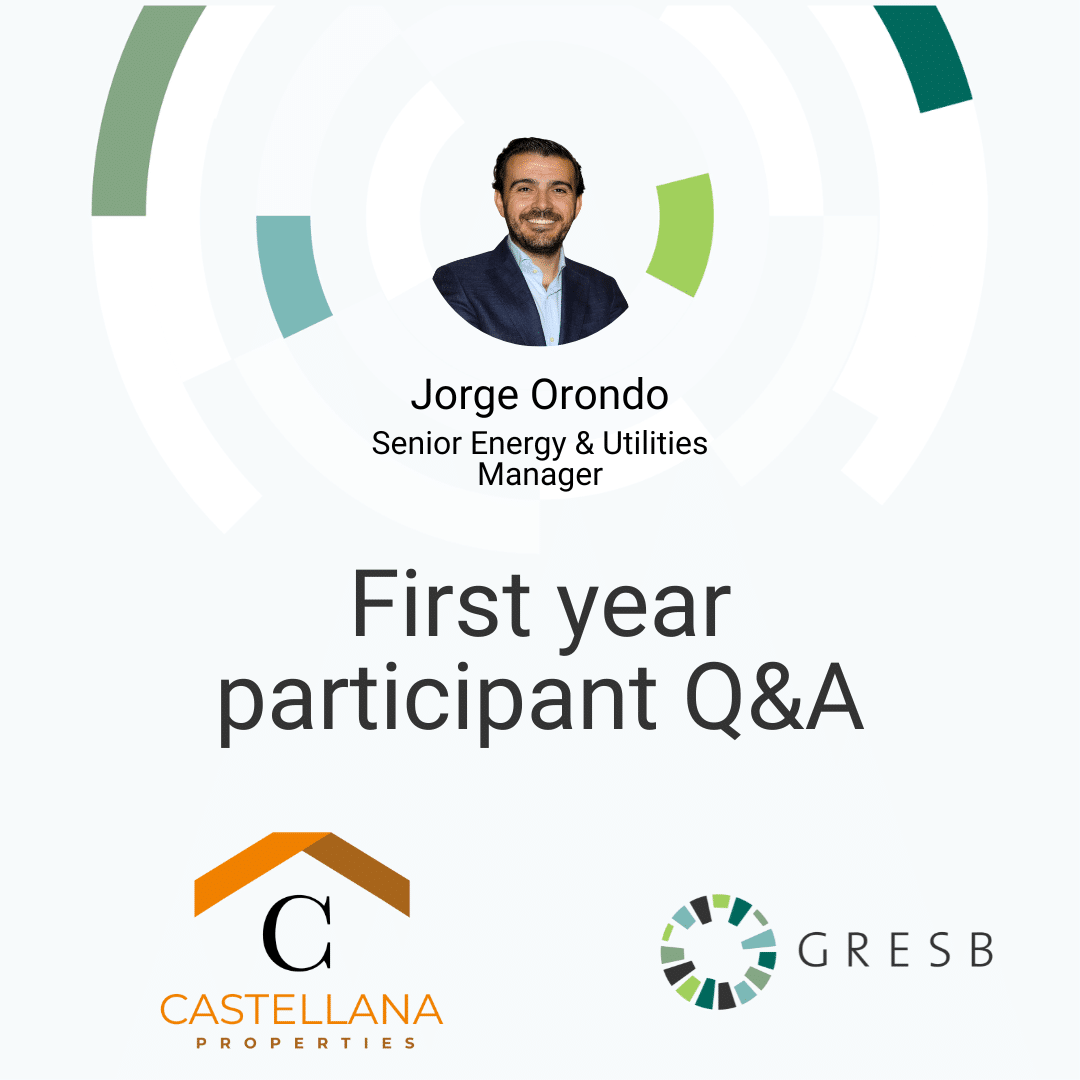Castellana Properties is one of the leading SOCIMIs in the Spanish market, dedicated to the acquisition, management, and rehabilitation of shopping centers and retail parks. The firm generates predictable, sustainable, and growing income streams for its investors through the optimization of portfolio performance, active portfolio management, a solid financial management, and the provision of a top-quality experience to its operators and clients.

Name: Jorge Orondo, Senior Energy & Utilities Manager
GRESB Assessments or tool: GRESB Real Estate Assessment (Management & Performance)
AuM: EUR 1.1 billion as of March 31, 2023, (LAR investment included)
Region: Spain
Entities: 1
Starting year with GRESB: 2022
Partner: Yes
What motivated you to start participating in the GRESB Assessments and what were you doing for ESG/sustainability prior to joining GRESB?
Last year we presented our first sustainability report and ESG strategic plan through to 2025, which is focused on eight sustainable development goals and defines our objectives for the short, medium, and long term, including reporting to GRESB. In addition to the reputational value of participating in the benchmark, using an objective and consistent evaluation framework allows us to refine our roadmap to guarantee continuous improvement in the areas of management and performance of our assets.
How long had you considered doing GRESB before you started?
We try to be as agile as possible in our decision making, so as soon as our ESG strategy was approved, it was decided that our goal was to report to GRESB in the next available reporting period. This was a substantial challenge, mainly due to the amount of data and documentation which must be collected and reported, but we are very satisfied with the results.
Has your perspective on ESG reporting and benchmarks changed since starting GRESB? If so, how, and do you see things differently compared to when you started?
When we started to review the GRESB requirements, we realized that we were not starting from scratch because we were already addressing many of these issues in our usual company practices. In this sense, the GRESB methodology has helped us to reinforce our strengths and define areas of opportunity for improvement.
What did you find most helpful when preparing and completing your assessment submission? What did you find most challenging?
It was very helpful to have the external advice of MACE, a GRESB Partner, and their experience in the reporting process. Proper planning and continuous monitoring of the work to be done are key to meeting the objectives. In my experience, the biggest challenge for participants active in the retail sector is to collect all the required data on tenants’ private consumption to achieve a meaningful coverage of the portfolio.
What did you find most valuable in the resulting GRESB benchmarks and data and how have you been using them?
The results have helped us quantify our performance in the areas of Management and Performance through the score obtained in terms of absolute value and in relation to the performance of our peers and the sector. The aggregate star rating provides a communication mechanism that is easily assimilated by investors and other stakeholders because it accurately and simply describes your current performance and allows you to set your improvement roadmap for the following years.
What are the most important insights or learnings you’ve uncovered with GRESB data? Especially in light of your strategy/property type.
It has allowed us to identify our strengths and areas for improvement, based on the assessment of our own performance against the evaluation criteria, as well as in light of the performance of our peers in the same categories. We were very strong in Management, scoring 28 out of 30 points, standing out in Leadership, Policies, Reporting, Stakeholder Engagement, and Targets. In Performance, we expect to improve in Data Monitoring & Review, increasing data collection in Energy, GHG, Water, and Waste.
How are you preparing for next year’s Assessments? Please share how you are leveraging your first-year results and learnings to prepare for your second-year submission.
Since we received the GRESB Benchmark Report, together with MACE we have defined an action plan that will allow us to maintain our score in the areas in which we obtained a good result while also improving our performance in those categories where we detected opportunities for improvement through the implementation of specific measures. For example, implementing an environmental management system according to ISO 14001, carrying out a climate risk analysis of the entire portfolio, or recording all consumption data in an online platform.
Now that you have done GRESB, what advice would you have given yourself prior to doing the assessment?
Start the process as soon as possible and define an appropriate strategy to collect all the data, especially the data that has the most influence on the score. Our recommendation would be to start with data over which you have operational control (common areas, mostly) and expand the coverage with tenant data as it becomes available on the basis of green lease agreements.